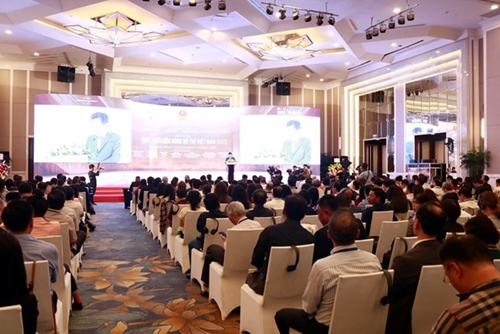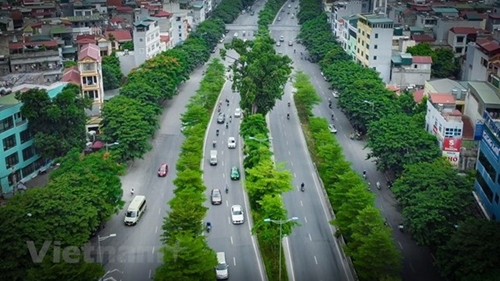The Politburo’s Resolution 06-NQ/TW affirmed that urbanization is inevitable and is the driving force of urban development, he said, stressing the need to make careful preparations to ensure urban areas can promote their roles defined by the Politburo, helping to enhance the life quality of the community and increasing new surplus values for socio-economic and environmental development.
    |
 |
|
An overview of the forum on sustainable urban development held in Hanoi on November 8 |
According to the Resolution, after 35 years of “Doi moi” (Renewal), Vietnam has gained important achievements in urban development, including the expansion of urban spaces and improved socio-economic infrastructure. The economy of urban areas has grown at a high rate, contributing 70% of the country’s GDP.
Economic growth poles and centers for science-technology, innovation, education and training have been formed in major cities, especially Hanoi and Ho Chi Minh City. By the end of September 2023, the country has 902 urban areas, including two special–level urban areas, along with 22 tier-1, 35 tier-2, 46 tier-3, and 94 tier-4 urban areas.
However, Nghi pointed out a number of shortcomings during the urbanization process, with the urbanization rate below the target set at the socio-economic development strategy for the 2011-2020 period, and a big gap between the country’s urbanization rate and the world’s average.
Meanwhile, the quality of urbanization has been low, and the quality of urban infrastructure has yet to meet the requirements of population and economic development, he added.
In order to deal with these problems and realize the Politburo’s Resolution, the Government issued a resolution on an action program to implement the Politburo’s resolution, with the aim of speeding up urbanization and enhance the quality of the process and form a chain of smart cities connecting with the region and the world, he said.
Besides, the country needs to complete institutions and policies regarding sustainable urban planning, construction, management and development, while boosting the comprehensive urban technical infrastructure, ensuring fast and sustainable urban economic development and improving the living conditions of people in urban areas, Nghi said.
    |
 |
|
(Photo for illustration: Vietnam+) |
The minister said that the Government’s action program defines 11 specific targets for the urban system, which provides a foundation for ministries, agencies and localities to build their own action plans in the work.
Nguyen Duc Hien, Vice Chairman of the Party Central Committee’s Economic Commission, said that currently, 60 out of 63 provinces and centrally-run cities nationwide have built and issued their own plans of action to realize Resolution 06, showing their high awareness of the role, position and significance of urbanization and fast and sustainable urban development.
Meanwhile, Director of the Urban Development Agency under the Ministry of Construction Tran Quoc Thai proposed building five policies on sustainable urban management and development in Vietnam, including classifying and managing the development of a sustainable urban system with synchronous network suitable for particular regions, managing new areas, upgrading and re-developing modern, green, smart urban areas towards sustainable development.
Besides, it is necessary to develop a synchronous urban infrastructure system with strong connectivity and resilience to climate change, he said, stressing the need to manage the urban underground space and speed up decentralization and delegation of power in urban management and development, he added.
Source: VNA